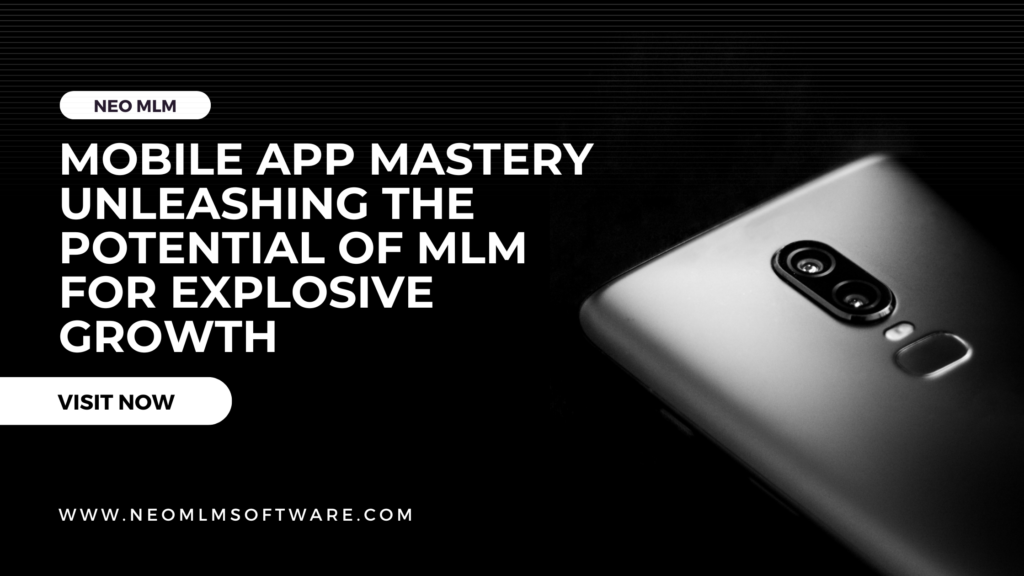- Have any questions?
- +91 9446 858 871
- +91 9400 550 510
- info@neomlmsoftware.com
MLM Software Integration: Your Key to Streamlined Business Growth

How the Festive Season Transforms Direct Selling
August 26, 2023
India’s Latest Direct Selling Rules Revealed 2023
September 16, 2023In the fast-paced world of multi-level marketing (MLM), efficiency and organization are paramount to success. To thrive in this highly competitive industry, businesses need to streamline their operations, manage their networks effectively, and stay ahead of the curve. One crucial tool that can make all the difference is MLM software integration. In this article, we will explore how MLM software can be your key to streamlined business growth.
Table of Contents
Understanding MLM Software
Certainly! MLM (Multi-Level Marketing) software integration refers to the process of incorporating MLM software into an existing business infrastructure or website. MLM software is designed to help manage and streamline the operations of multi-level marketing companies, where distributors or members earn commissions not only for their sales but also for the sales made by the distributors they recruit.
Here are the key aspects of understanding about MLM software
- Integration Goals: The primary goal of MLM software integration is to automate and simplify various MLM-related tasks, including commission calculations, member management, sales tracking, and reporting. It aims to enhance efficiency and accuracy in managing a multi-level marketing network.
- Customization: MLM software can be customized to align with the specific compensation plan and business model of the MLM company. Different MLM companies have various compensation structures, such as binary, matrix, or unilevel plans, and the software needs to adapt accordingly.
- Website Integration: MLM software is often integrated with a company’s website or online portal. This integration allows for seamless member registration, product ordering, and online commission tracking. It should also provide a secure login system for members to access their accounts.
- Member Management: MLM software typically includes a member management system. This allows administrators to add, edit, or deactivate members, track their performance, and handle issues related to downline organization.
- Commission Calculations: One of the most critical functions of MLM software is the accurate calculation of commissions. It should automatically calculate commissions based on the compensation plan in place, including bonuses, overrides, and incentives.
- E-commerce Integration: Many MLM companies sell products or services through an e-commerce platform. MLM software can be integrated with these platforms to facilitate online sales, inventory management, and order processing.
- Reporting and Analytics: MLM software provides reporting tools that enable administrators to monitor the performance of their MLM network. These reports may include sales data, member activity, and commission payouts.
- Security and Data Protection: Protecting sensitive member and transaction data is crucial. MLM software should adhere to security best practices to prevent unauthorized access and data breaches.
- Scalability: As an MLM business grows, the software should be scalable to accommodate an increasing number of members and transactions without compromising performance.
- Training and Support: MLM software vendors typically offer training and support services to help businesses set up, configure, and use the software effectively. Ongoing support is essential for resolving issues and keeping the software up to date.
- Legal Compliance: MLM companies must comply with relevant laws and regulations, which vary by region and country. The software should include features or tools to ensure compliance with legal requirements.
In summary, MLM software development is a crucial step for multi-level marketing businesses to streamline their operations, manage members, calculate commissions accurately, and grow their networks. Choosing the right MLM software and ensuring a seamless integration process is essential for the success of an MLM business.
The Benefits of MLM Software Integration
MLM (Multi-Level Marketing) software integration offers numerous benefits to businesses and organizations involved in network marketing. Here are some key advantages:
- Efficient Management: MLM software automates various tasks, such as tracking sales, commissions, and downline activities. This streamlines management processes, reduces manual errors, and saves time and effort.
- Real-Time Monitoring: Integration allows real-time monitoring of network activity. Distributors and administrators can access up-to-date information on sales, recruits, and commissions, empowering them to make informed decisions.
- Scalability: MLM businesses often expand rapidly. Integrated software can handle growing networks and adapt to changes in the business model, ensuring scalability without disruptions.
- Accurate Commissions: MLM software accurately calculates and distributes commissions based on predefined compensation plans. This transparency and reliability build trust among distributors.
- Data Analysis: Integration provides access to valuable data and analytics. Businesses can analyze trends, identify high-performing distributors, and make data-driven decisions to optimize their strategies.
- Inventory Management: Some MLM businesses sell physical products. Integration can help manage inventory, track stock levels, and automate reordering, preventing overstocking or understocking issues.
- Communication: Integrated software often includes communication tools, such as messaging and email, which facilitate better communication between distributors, uplines, and the company.
- Security: MLM software development enhances data security. It can implement access controls, encryption, and backups to protect sensitive distributor and customer information.
- Streamlined Onboarding: When new distributors join, the software can automate the onboarding process, providing training materials, tracking progress, and ensuring a smooth start.
- Global Reach: MLM companies often operate internationally. Integration can support multiple languages, currencies, and tax systems, making it easier to expand into new markets.
- Customer Support: MLM software can include customer support features to address distributor and customer inquiries, improving overall satisfaction.
- Compliance: MLM businesses must adhere to various regulations. Integrated software can help ensure compliance with legal requirements, reducing the risk of legal issues.
- Cost Savings: While there is an initial investment in integrating MLM software, it can lead to long-term cost savings by reducing manual labor and errors.
- Improved Reputation: Reliable software and efficient management can enhance a company’s reputation within the MLM industry, attracting more distributors and customers.
- Enhanced Reporting: Integrated software generates detailed reports on various aspects of the business. These reports can be used for performance evaluation, decision-making, and presentations to stakeholders.
In conclusion, MLM software development offers numerous advantages that can boost the efficiency, transparency, and profitability of network marketing businesses. It helps manage the complexities of multi-level compensation plans and provides the tools necessary for growth and success in the MLM industry.

Choosing the Right MLM Software
Choosing the right MLM (Multi-Level Marketing) software is crucial for the success of your MLM business. MLM software plays a pivotal role in managing your network, tracking sales, and ensuring compliance. Here are some essential factors to consider when selecting MLM software:
- Features and Functionality:
- Look for software that offers a comprehensive set of features, including commission tracking, genealogy management, e-commerce integration, and reporting tools.
- Ensure it supports the compensation plan(s) your MLM business uses, whether it’s binary, matrix, unilevel, or others.
- Scalability:
- Choose software that can grow with your business. It should handle an increasing number of distributors and transactions without compromising performance.
- User-Friendly Interface:
- The software should be intuitive and user-friendly for both administrators and distributors. A complex interface can lead to errors and frustration.
- Customization Options:
- Your MLM business may have unique requirements. Ensure the software allows customization to meet your specific needs.
- Security and Compliance:
- MLM businesses often have to comply with legal regulations. The software should provide security measures to protect sensitive data and ensure compliance with industry standards.
- Support and Training:
- Consider the level of customer support and training provided by the software vendor. Reliable support is crucial when issues arise.
- Integration Capabilities:
- Check if the software can integrate with other essential tools and systems, such as CRM software, payment gateways, and e-commerce platforms.
- Mobile Compatibility:
- In today’s mobile-centric world, having a mobile-responsive interface or a dedicated mobile app can be a significant advantage for distributors.
- Cost and Pricing Structure:
- Understand the pricing model, whether it’s a one-time purchase, subscription, or commission-based. Compare costs with the features offered to ensure it aligns with your budget.
- User Feedback and Reviews:
- Research user reviews and testimonials to gauge the software’s reputation and reliability in the MLM industry.
- Vendor Reputation:
- Choose a reputable vendor with a track record of providing reliable MLM software. Check for references and customer feedback.
- Data Backup and Recovery:
- Ensure the software has robust data backup and recovery mechanisms to prevent data loss in case of unforeseen events.
- Upgrades and Maintenance:
- Inquire about software updates and maintenance plans. Regular updates ensure your MLM software stays current and secure.
- Trial Period:
- Whenever possible, take advantage of a trial period to test the software’s functionality and suitability for your MLM business.
- Scalability:
- Consider your long-term growth plans. Ensure that the chosen MLM software can scale up to accommodate a larger distributor network.
- User Training:
- Assess the availability of training resources and materials for both administrators and distributors. A well-trained team can maximize the software’s benefits.
- Data Migration:
- If you are transitioning from an existing MLM software, discuss data migration options with the new vendor to ensure a smooth transition.
- Feedback and Reviews:
- Seek feedback from current users of the MLM software to understand their experiences and any potential issues they may have encountered.
By carefully evaluating these factors, you can make an informed decision when choosing the right MLM software that aligns with your business goals and needs. Remember that the software you select can significantly impact the efficiency and success of your MLM venture.
Implementing MLM Software Integration
Training and Support
The successful implementation of MLM software hinges on adequate training and ongoing support. Ensure that your software provider offers comprehensive training for your team. Additionally, having access to reliable customer support is essential to address any issues promptly.
Data Migration
If you are transitioning from manual processes or existing software, data migration is a critical step. Your chosen software provider should offer seamless data migration services to ensure that no valuable information is lost in the transition.


Measuring Success
To gauge the effectiveness of MLM software integration, you should establish key performance indicators (KPIs). These could include increased sales, reduced administrative overhead, and distributor satisfaction ratings. Regularly assess these KPIs to track your progress and make necessary adjustments.
Real-Life Success Stories
Let’s take a moment to look at some real-life success stories of MLM businesses that have embraced software integration. These businesses experienced significant growth, streamlined operations, and improved distributor retention rates, all thanks to their software solutions.
The Future of MLM Software Integration
The future of MLM (Multi-Level Marketing) software integration holds several exciting possibilities, driven by advancements in technology and changing market dynamics. MLM businesses rely heavily on software solutions to manage their operations, compensation plans, and member networks. Here are some key trends and developments shaping the future of MLM software:
- Blockchain Technology: Blockchain has the potential to revolutionize MLM by providing transparent and tamper-proof record-keeping. Smart contracts can automate commission payouts, ensuring accuracy and trust within the network. Blockchain also enhances security by reducing the risk of fraud and ensuring that data remains immutable.
- Artificial Intelligence (AI) and Machine Learning: AI can help MLM companies analyze vast amounts of data to identify trends and opportunities. Machine learning algorithms can optimize compensation plans, making them more effective and adaptive to changing market conditions. AI-powered chatbots can provide real-time support to distributors and customers.
- Mobile Integration: The future of MLM software is undoubtedly mobile-centric. Mobile apps will become even more essential for distributors to manage their businesses on the go. These apps will offer features such as real-time reporting, inventory management, and communication tools.
- E-commerce Integration: MLM companies will increasingly integrate their software with e-commerce platforms. This allows distributors to sell products online seamlessly, while the software manages inventory, orders, and commissions. Integration with popular e-commerce platforms like Shopify or WooCommerce will become commonplace.
- Personalization: MLM software will become more personalized, tailoring content and marketing materials to individual distributors and customers. This personalization will improve engagement and help distributors grow their networks more effectively.
- Global Expansion: As MLM businesses expand internationally, their software needs to support multiple languages, currencies, and compliance requirements. Cross-border integration will be a significant focus to ensure seamless operations across diverse markets.
- Advanced Reporting and Analytics: MLM software will offer more advanced reporting and analytics tools. Distributors and company leaders will have access to real-time data, enabling them to make informed decisions and adjust their strategies quickly.
- Social Media Integration: Social media plays a crucial role in MLM marketing. Future software solutions will integrate with social platforms to streamline lead generation, marketing campaigns, and communication with prospects and downlines.
- Security and Compliance: With the increasing scrutiny on MLM companies, software integration will prioritize compliance with regulations in various regions. Strong security measures will be essential to protect sensitive data and maintain trust among distributors and customers.
- Sustainability and Ethical Considerations: MLM companies will need to demonstrate a commitment to sustainability and ethical practices. Software integration will include features to track and report on sustainable initiatives, ensuring transparency and accountability.
In the future of MLM software integration is marked by technological advancements that enhance transparency, efficiency, and user experience. Blockchain, AI, mobile apps, e-commerce integration, and personalization are some of the key trends shaping the industry. As MLM companies continue to adapt to changing market dynamics and regulatory environments, their software solutions will evolve to meet these challenges and provide a competitive edge in the industry.
Conclusion
In the highly competitive world of multi-level marketing, MLM software integration is no longer an option but a necessity. It empowers your business with the tools needed to thrive, providing improved network management, enhanced efficiency, and accurate compensation calculations. As you explore the possibilities of MLM software integration, remember to choose a solution that aligns with your business goals and values.
FAQs
Q1: Is MLM software integration suitable for small businesses?
Yes, MLM software integration can benefit businesses of all sizes. It helps streamline operations, reduce manual work, and improve efficiency, which are crucial for growth.
Q2: How long does it take to implement MLM software integration?
The implementation timeline varies depending on the complexity of your business and the software chosen. It can range from a few weeks to several months.
Q3: Can MLM software integration handle international networks?
Yes, many MLM software solutions are designed to manage international networks, including multi-currency support and language options.
Q4: What should I look for in an MLM software provider?
Look for customization options, scalability, compliance features, and a track record of successful implementations. Also, consider the quality of training and support provided.
Q5: Where can I access reliable MLM software integration services?
bit.ly/2MyzGyu
In conclusion, MLM software integration is the key to achieving streamlined business growth in the MLM industry. By harnessing the power of specialized software, you can optimize your network, boost efficiency, and pave the way for sustainable success.





